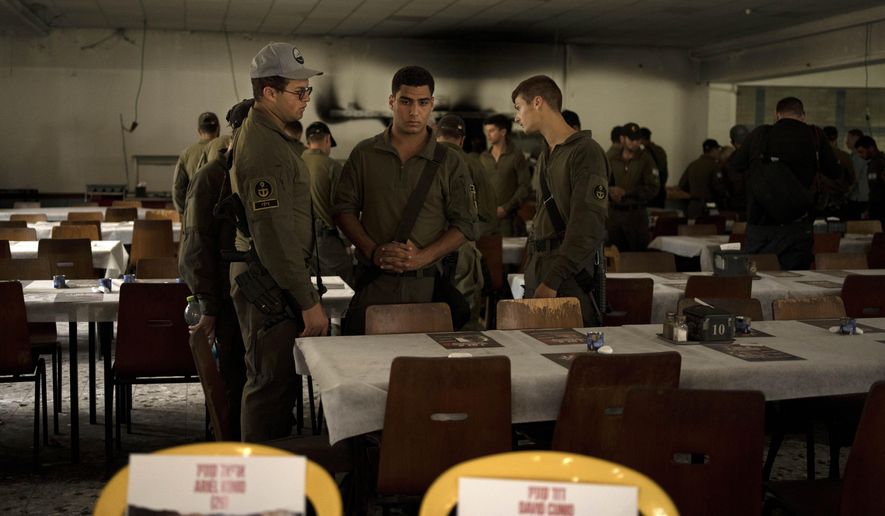OPINION:
The nights of Passover are different from all other nights, and this year even more so. Your Jewish neighbors will soon gather to recall their ancestors’ liberation from ancient Egypt and the start of their long journey to Israel, but as your neighbors celebrate this year, they will also grieve.
Lately, I’ve been thinking about Passover and its many contradictions.
Subscribe to have The Washington Times’ Higher Ground delivered to your inbox every Sunday.
This sacred and widely observed holiday commemorates the Hebrews’ exodus from Egypt. To celebrate, Jews gather at the dinner table for a seder, a ceremonial meal packed with rituals, stories and prayers. “Seder” is a Hebrew word meaning “order,” and Jews have conducted the Passover holiday in the same order for about 1,500 years.
Throughout the seder, we experience contradictions that reflect the central question of the holiday: Why is this night different from all other nights?
We eat bitter herbs and salt water to remember the tears of the Hebrew slaves and later we sing songs of gratitude, praising God for their liberation. We move through a precisely ordered meal and follow a detailed script of blessings, all while we lounge in our pillowed seats. As we tell stories of our ancestors – suffering, outcast and enslaved in Egypt – we leave the door open to welcome Elijah the Prophet as well as strangers to our Passover festivities.
SEE ALSO: Apparent Israeli strike targets Iranian military base in limited attack
This year, thousands of Jewish families will leave an empty chair for Elijah and notice the empty chairs that their loved ones used to fill. As hostages remain in Gaza and heroes remain on the front lines protecting Israel, this Passover will be different from all other nights in the traditional ways and more.
For more than a millenia, Jews preserved the seder. Despite the Crusades, blood libels, accusations of causing the Black Plague, the Inquisition, the Holocaust and other antisemitic events, Jewish tradition has protected order in chaos. Many Jews have observed Passover in their homes no matter the circumstance.
Passover is a festival full of contradictions in many ways. This year, your Jewish neighbors will experience these contradictions acutely, welcoming visiting family and strangers while mourning those lost on October 7.
But Jews are a people of contradictions.
While Jews are a small minority – only 0.2% of the world’s population – we face astonishing amounts of hate crime.
Yet, despite all of the hate we know at the International Fellowship of Christians and Jews, we also know that there are millions of Christians who stand with Israel and provide practical help every day for Jews in need.
Yes, amid hatred, Jews can and must hope for the future. This is the Passover story and this is our tradition.
I am reminded of how Jews in the Holocaust kept tradition in an impossible circumstance. Jews sung Hatikvah – ”The Hope,” in Hebrew – in concentration camps as an act of defiance. Today, Hatikvah is Israel’s national anthem.
To be a Jew – in Egypt, in Auschwitz and in too many places today – means to face your oppressors with hearts full of hope.
I have been thinking about Dina Kraus, whose unlikely seder exemplifies this message and inspires me still. Dina was born in Czechoslovakia and, as she studied Hebrew, she found her calling as a Hebrew teacher. In September 1944, when her teaching colleagues returned to the classroom, Nazis took Dina to Unterluss, a labor camp in northern Germany.
As Passover approached, some young ladies in the camp asked Dina to lead a secret seder. They did not have a seder plate nor any of the traditional Passover foods. They had no wine, nor did they have a ceremonial cup to leave for Elijah. They did not have a Haggadah, the Passover guide and prayer book.
But they had a Hebrew teacher.
Dina reflected on her childhood memories of sitting at seders, all the lessons she learned in school and all that she taught her own students about Jewish tradition.
She wrote the Haggadah from memory with pencil.
In secret, with hushed voices and hummed songs, the ladies risked egregious punishment as they followed the Haggadah and whispered in Hebrew, “This year we are slaves, but next year we will be free.”
Dina survived. Nazis transferred her to Bergen-Belsen which British troops liberated in 1945. Once freed, Dina returned to the classroom, this time teaching refugee children in Sweden. She committed herself to hope, educating the next generation so that they could make the best of their freedom and lead seders of their own, chanting prayers with pride and singing songs of praise as loudly as they liked.
I think of Dina as I ready my own home for the holiday.
As your Jewish neighbors are preparing for Passover, their hearts are heavy but full of hope. Jews must embrace the many contradictions of Passover – of being a Jew – and celebrate freedom, grieve tragedy and, above all, honor hope. Our Christian friends make it all easier, especially this year.
–
Yael Eckstein is President and CEO of The International Fellowship of Christians and Jews (The Fellowship), one of the world’s largest religious charitable organizations. The Jerusalem Post’s 2023 Humanitarian Award recipient and 3-time honoree on its 50 Most Influential Jews list, Yael is a Chicago-area native based in Israel with her husband and their four children.




Please read our comment policy before commenting.